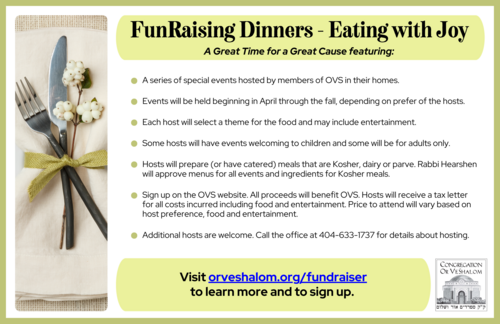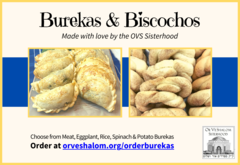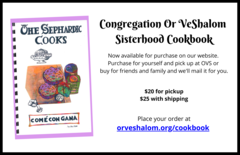Chametz
03/30/2023 02:46:26 PM
Rabbi Hearshen
| Author | |
| Date Added | |
| Automatically create summary | |
| Summary |
What is חמץ/Chametz? It’s a classification of food we’re not permitted to eat for eight (seven in Israel) days a year. But it’s much more complicated than that simplistic answer. חמץ is anything made from five species of grains: wheat, spelt, barley, oats and rye that hasn’t been watched to assure it isn’t allowed to rise. That means many of the things we eat during Passover have the ability to be classified as חמץ, but because extra care was taken to assure it’s not, we are able to eat it. Additionally, any utensils used with חמץ are considered to be חמץ themselves. The fine line between חמץ and Kosher for Passover is something that’s inherently Jewish. We take something that in other situations would be ordinary and make it sacred. As Jews, we see something that would be prohibited in some circumstances but is permitted in other cases. There’s also another type of חמץ that exists and this one’s a bit more metaphorical… it’s called the evil inclination inside of us. If חמץ is something that can rise but doesn’t rise, and is therefore permitted, perhaps we can understand that the evil inside us is something that’s also חמץ.
The laws on Passover regarding חמץ are nuanced and involved but the basic laws are: Jews are forbidden to eat חמץ, to own it, to see it and to derive benefit from it. Additionally, חמץ is something that cannot be nullified by any proportion, and as such, we have to be extra careful to not allow anything that’s come into contact with חמץ to touch our food during Passover. Since we’re forbidden to own חמץ on Passover, we’ve created a method to get rid of our חמץ without throwing it all out or donating it all. We can sell it to a person who is allowed to own חמץ during the holiday, a non-Jewish person. This allows for Jews not to lose enormous amounts of money during the holiday each year. Please be sure to submit your Selling Chametz Form to the office by Monday so we can include your חמץ in our communal sale. Click here for the form.
Freedom is something that can easily be lost to slavery if we are not extra careful in preserving it. Passover is when we celebrate liberation from slavery, but all too often we become slaves to our evil inclinations. We become enslaved by our drive for power and fame and vengeance. Being enslaved by our evil inclinations is damaging not only to us, but to our world as well. As we prepare for Passover, can we each think of the חמץ within us and how we can get rid of it? Can we think about burning up that anger and hurt in the same way we destroy our bread and other חמץ on the morning of Passover? Can we find a way to rid ourselves of that destructive force by selling it off or taking time away from it for a week, the week of Passover?
It’s important not to just go through the motions of observing the holidays. We need to find ways to dig deeper and get more from our sacred observances. The way to do that is not to just read the Haggadah but to live it. We can dig deeper by spending time not just eating Kosher for Passover foods but by figuring out why it matters at all (finding the answers to the first of the four questions). We can dig deeper by seeing there’s more we can do than simply showing up to the table. This year let’s all liberate ourselves from some of the darkest things that enslave us and let us do so to build better lives and better worlds.
Tue, April 23 2024
15 Nisan 5784
Worship Services
Coming Soon at OVS
-
Sunday ,
MayMay 5 , 2024Sisterhood Fiesta Fun with Flowers
Sunday, May 5th 10:30a to 12:00p
Learn floral design techniques and create a fresh cut flower arrangement to take home. Limited to 30 people. Individual registration only. -
Sunday ,
MayMay 5 , 2024FunRaising Dinner - Bob and Dale Israel
Sunday, May 5th 6:00p to 8:00p
Join us for dinner hosted by OVS members Bob and Dale Israel. All proceeds benefit OVS. -
Sunday ,
MayMay 5 , 2024FunRaising Dinner - Rabbi and Carrie Hearshen
Sunday, May 5th 6:00p to 8:00p
Join us for dinner hosted by Rabbi and Carrie Hearshen. Rabbi Hearshen will prepare his famous BBQ! All proceeds benefit OVS. -
Sunday ,
AugAugust 11 , 2024FunRaising Dinner - Clare and Robert Habif
Sunday, Aug 11th 6:30p to 8:30p
Join us for a Cuban dinner hosted by Clare and Robert Habif. All proceeds benefit OVS.
Burekas & Biscochos
The Sephardic Cooks
My Preferences for Contact
Tonight's Sefirah Count Is 1
| היום יום אחד לעמר |
Today's Calendar
| Pesach |
| Bureka Making : 9:30am |
| Candle Lighting : 8:51pm |
Candle Lighting
| Tuesday, Apr 23, 7:57pm |
Havdalah
| Wednesday, Apr 24, 8:52pm |
Pesach
| Tuesday, Apr 23 |
OVS Feature Video



